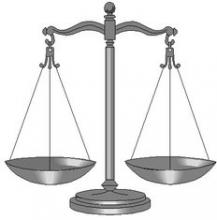Shabbat Shalom and welcome to Judeo Talk. The Torah portion for this week is Parsha Ki Teitzei, Deuteronomy 20:10-25:19.
There is a seemingly unassuming passage at the end of Ki Teitzei that forbids the use of "diverse weights", which is to say tools with which to cheat people in business. Whether in measuring grain, grapes or gold, everything must be honest and fair. That's what this entire parsha is really about. It is concerned with what the culture at that time viewed as justice and propriety.
The Torah is hardly unique in its use of scales as a metaphor for justice. Countless cultures have recognized that same symbol on their own. To me, this seems to be the key to understanding the origins of the concept of "justice", however nebulous and subjective a term it is. The symbols found in the Torah come from some of the earliest civilizations in human history. They are the poetic devices of people for whom cities and codified laws were new concepts. One can infer that these ancient societies valued balance above all things. By this token, it can be argued that social values have since changed. Do our modern laws, whether of secular government or moral conduct, really hope to bring balance, or has their aim evolved past that?
Take, for instance, the stark contrast between ancient Judaism and modern Judaism concerning corporal punishment. In Ki Teitzei there are many crimes listed as punishable by death, beating, and in one case dismemberment. We have no reason to doubt that ancient Jews took these laws literally and seriously, though it has been several centuries since Jews applied any kind of death penalty. What changed between then and now that caused Jews and indeed many other societies to re-think such moral codes?
To put things lightly, no system is perfect. The older a system is, the more likely it is to be obsolete or based on incorrect assumptions. In ancient societies, people essentially tested the hypothesis that cultural balance can be achieved by unequivocally removing elements of imbalance, i.e. killing criminals, separating foods, creating social castes and forbidding foreign religions. This concept, at least on paper, sounds like it would work. Of course, it ignores the unacceptable cost of maintaining balance.
At some point in its history, Judaism as a philosophy underwent a significant value shift. It ceased to pursue balance at all costs and instead re-calibrated its focus to the preservation and improvement of life. Currently, the Jewish philosophical consensus is roundly against such things as the death penalty. Were we simply following the laws laid out in the Torah, or more accurately the Tanakh, this would not be the case. Just as we should explore why the laws and stories in the Torah say the things they say, we should also contemplate why our modern views differ from them.
The greatest lesson here is that it is effectively certain that our current system of rules is far from perfect as well. There are values we hold today that will prove to be incorrect or too costly to future societies. Even on the much more personal, local level, we can use the dissonance of Ki Teitzei as a reminder that our own individual values will likely change over the course of our lives.
